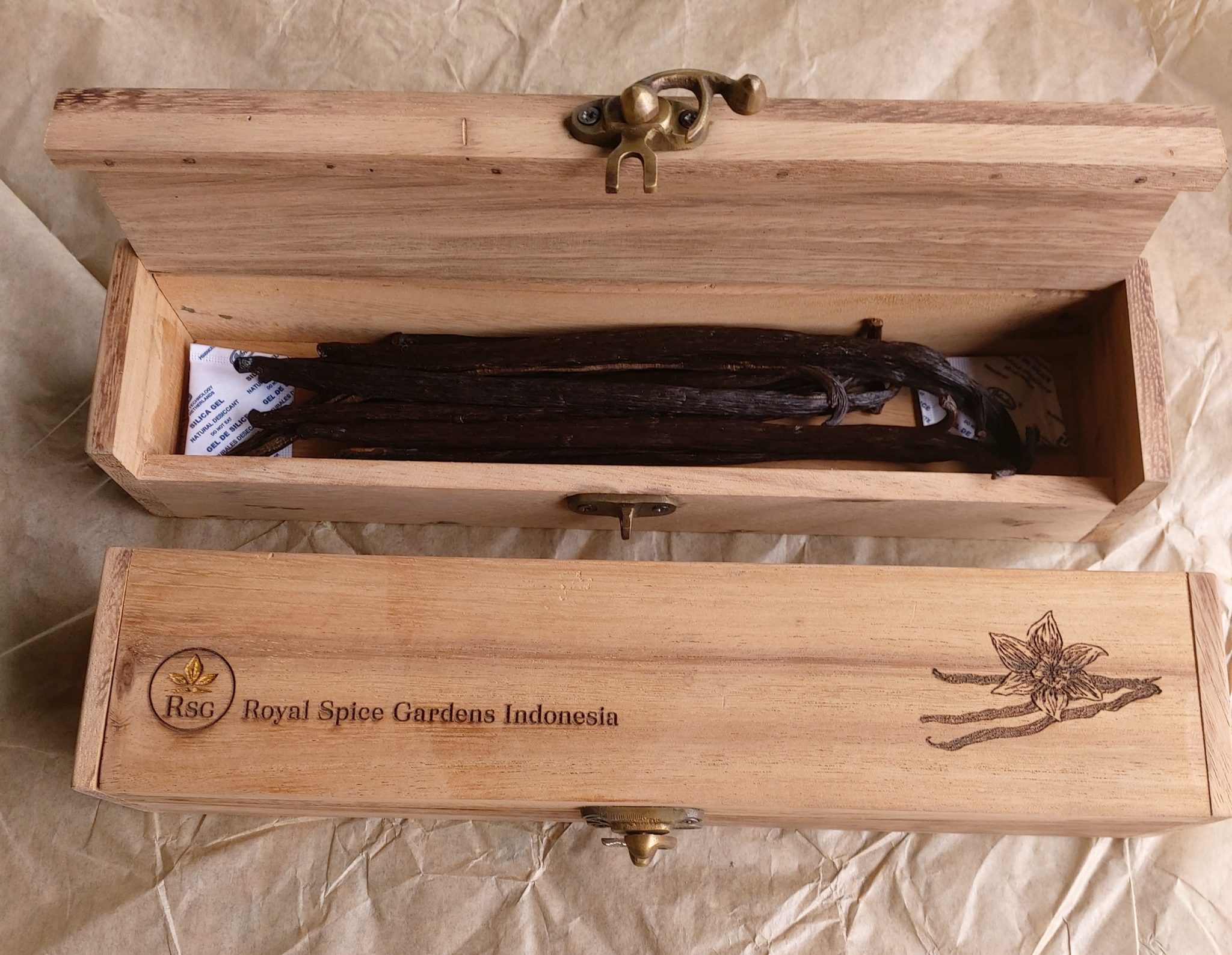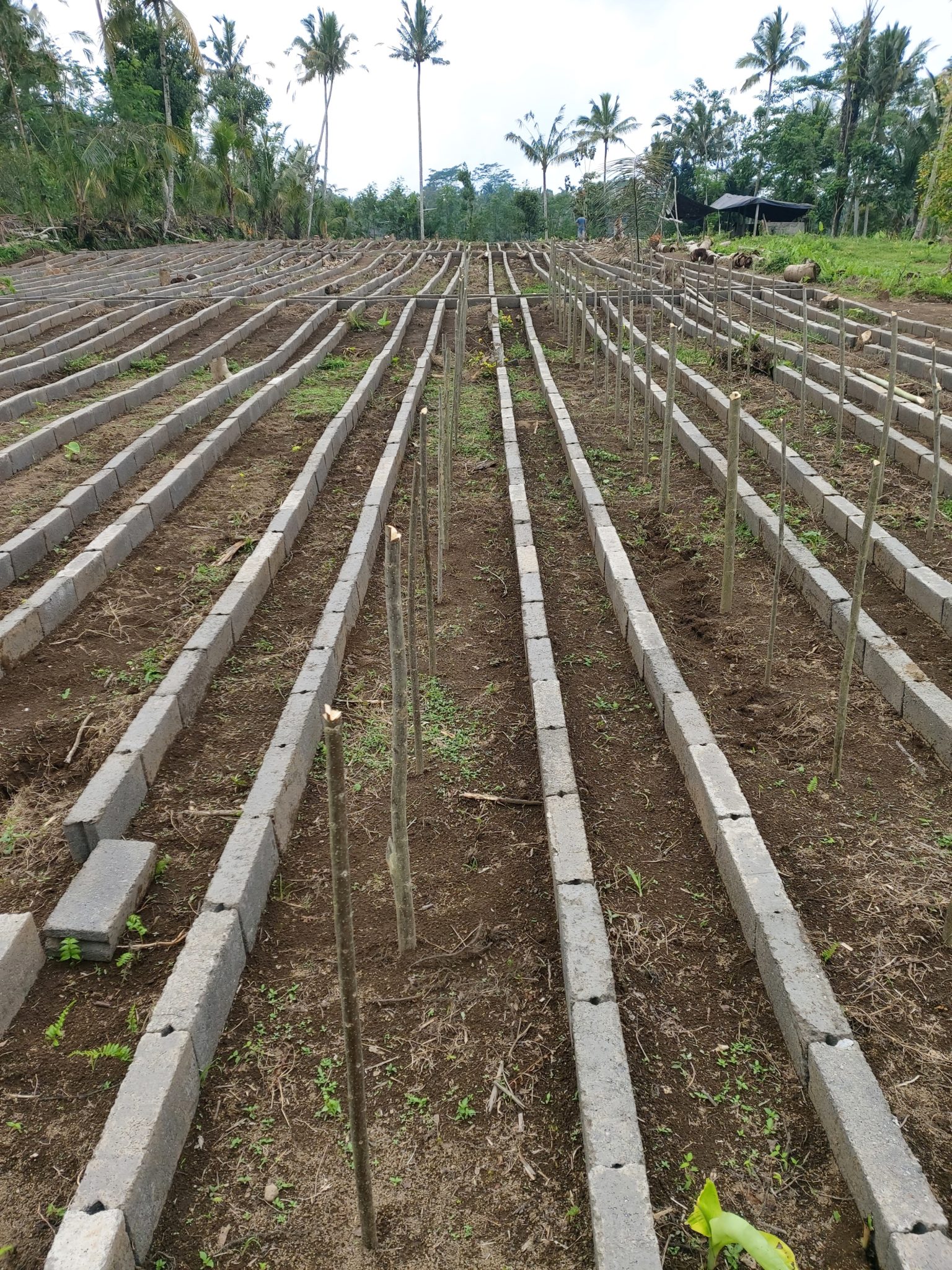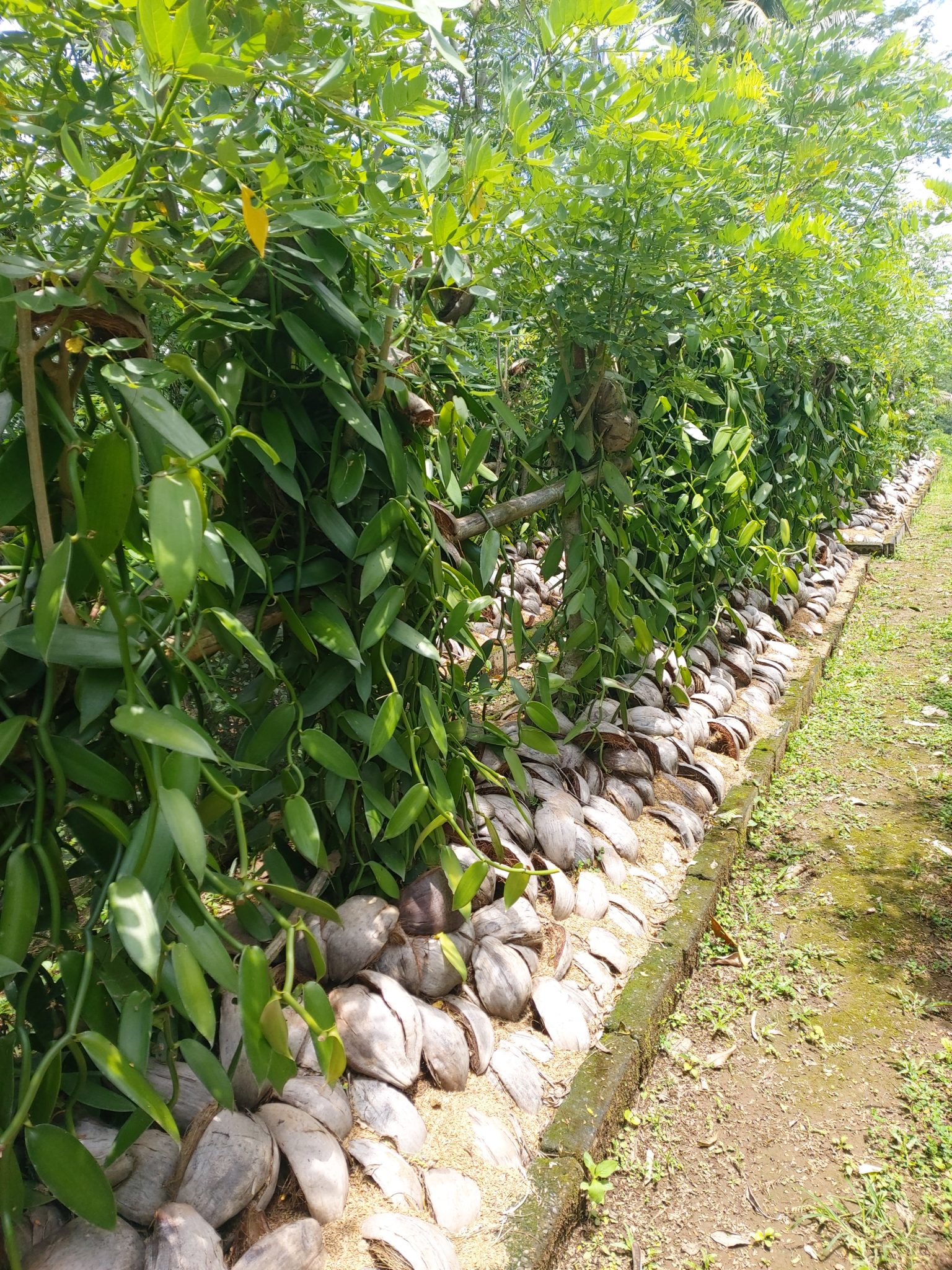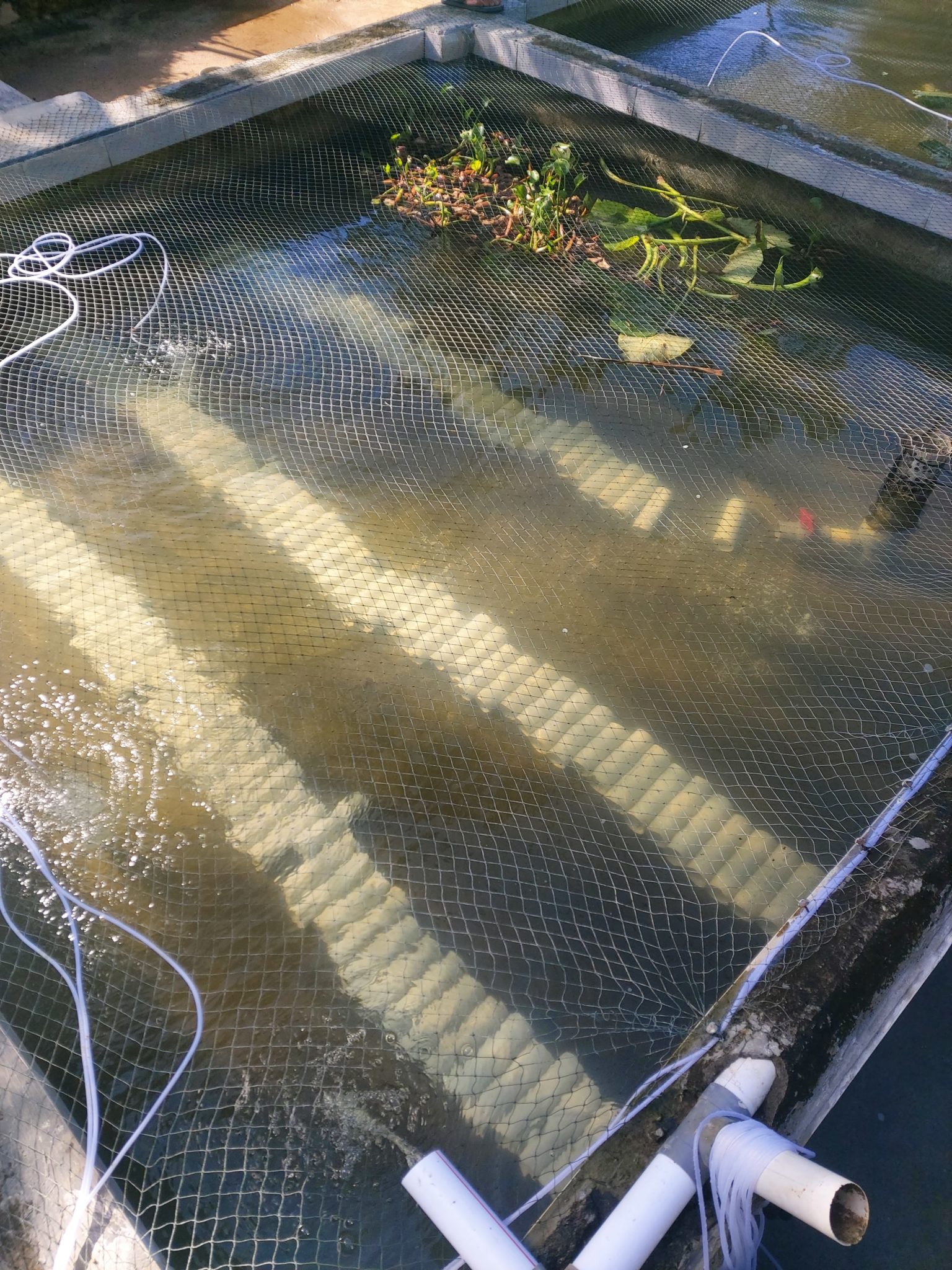
I hope you all enjoyed a spectacular Christmas and celebrated the New Year in your favourite way. Here in Bali, Christmas is not really celebrated, which is beneficial as all the restaurants are open and you may choose from the traditional cuisines of many nations, but New Year is celebrated with fireworks. These were banned, this year, a ban that was widely ignored!
Meanwhile, Royal Spice Gardens has enjoyed a year of steady growth and learning. We started the year with ten Gardens, two of which are not suited to vanilla, and a total of 6,322 vanilla plants in the ground.
We end it with seventeen Gardens and a total of 25,991 plants.

Garden 17, our largest to date.
I should say that we need to get away from this description of plants. You see, the way we grow vanilla is to make it circle round again and again, each time rooting. Which means that in effect we have a cluster of vanilla plants. Which never dies… Further, we encourage them to merge, so we end up with a wall of vanilla. How many plants is this? A conundrum.

We expect in due course to make our forecasts per m3 of garden, but for now we shall continue with this calculation of 5 kg green beans per year per vanilla plant, the same as used by the World Bank.
We use this calculation to give a value to the gardens, our only real asset. Old fashioned accountants would value the assets at the cost to plant. Modern MBAs would make a calculation based on the expected return in future years. They might say 20 years, but we take just 5, which means we get just one year from most of these plants. We aren't expecting an income for another two years, three or four for those planted this year.
This gives us a current asset value of 42 billion rupiah, just under 3 million dollars. This is due to be raised shortly, but we are looking at last year in this report.
The laboratory grown experiment failed in 2020, and we knocked it on the head in January. Since then, we have turned Garden 10 into a nursery where we have cuttings in cocopeat. This produces about 3,000 plants per month. We now add home made compost to the mix, which speeds up production.
The laboratory has just come back to us, to say they have solved their mould issues and can now produce vanilla plants. I am waiting to hear more.
The nutrition of the vanilla plants is of great interest to us, and we constantly try different mulches. Goat droppings, bat and duck guano. We prefer not to use chicken or pig manure, because that is far from organic. We do use cow manure. Recently, we started experimenting with home made compost with encouraging results. We are putting different plants in to see what happens. A common rice field weed is exciting right now, because it is full of potassium which can be hard to get into the compost. But the majority of the compost material comes from the trimmings when we keep the gardens clear.
We tried to bring forward the flowering season by pruning the shade trees earlier. This did not work. The vanilla is confused, and resolutely stopped flowering. We are now expecting it to flower at the end of the rains, which will be a great success. Much more suitable time to flower. This expectation is based on last year, when the rains inhibited flowering, and the plants flowers when the rains stopped. Long term, this is beneficial. The plants become stronger.
This year has seen us welcome Paul Preston aboard as our Managing Director. He is a respected professional with 18 years experience in about management within Indonesia, and he has accepted his salary to be paid in shares, for otherwise we could not possibly afford him.
He has sorted out the administration, appointed a new bookkeeper and ensured we are fully compliant with the law. This is not a simple task in Indonesia. We have appointed a board of directors and are seeking to establish the best way to have board meetings in the new era.
We took an opportunity to move into aquaculture, saving a local fish-farm in the process. We are farming red claw crayfish, a tropical freshwater lobster. I am particularly excited about these, because we can feed them on plant and insect material, thus overcoming the biggest environmental problems with aquaculture.

The converted fish farm.
The current farm can produce maybe six thousand lobster a month, in due course. However, it seems the market requires a lot more, so we plan to bring in some other fish farmers in the coming months.
We are not expecting a return from vanilla for another two years, but the lobster should bring a return within a year and has a great deal of potential.
Currently, we employ 23 Balinese, and this figure will increase as we expand next year. We have not started the culture tuition yet, as that is not planned till we are harvesting vanilla. It is not a large investment, but we would like to start it should budgets permit.
Breeding mynah received a setback during the year, when they alleviated boredom in the aviary by pruning the vanilla... when funds permit, we shall try again with finches, but other birds are a possibility. The trouble is, these require small cages for breeding and the aviary for preparing for release. I’m not fond of small cages...
We have received permission for the Otter cafe, which is designed to showcase the company. Preliminary budget indicates we’ll need about 500 million rupiah to get it going.
The share price has risen over the year to Rp 1,500,000. We have seen a number of large investors approach us over the year, and this has brought new challenges. They tend to think they can get shares for huge discounts. Sometimes they even want control – for very little in payment! These discussions have tended to end abruptly. We are currently talking with a few, including one which appears very promising. However, they need to come to Bali for due diligence and so far they haven't succeeded.
It is entirely possible that all the shares are taken this year, so if you know anybody who is interested, now is the time, before the price rises again, or indeed they are all gone.
The forecast for the year is continued growth, another 25 to 50,000 vanilla to be planted, with growth outside Bali. Lobster production up to a ton a week, but we shall create a subsidiary company for aquaculture.
We are also keen to start processing Oud oil, but this requires a substantial investment. Not just in the extraction equipment, which is considerable, but in buying the wood from the plantations. Nevertheless, the Middle East market is huge and the demand high.
We expect 2022 to be the first year in which we see income, but investment in vanilla is required for another 2 years, currently budgeted at $300,000. The value of the company should double, as vanilla yields come closer.
Rex Sumner
Royal Spice Gardens is an Indonesian Foreign Investment Company, in Indonesia known as a Perusahaan Modal Asing (PMA).
NIB Licence number 0220100502286. NPWP: 94.830.504.0- 905.000.
PT Royal Spice Gardens Indonesia, Jl. Raya Pejeng, Tampaksiring, Gianyar, Bali 80552, Indonesia
Website by Simia Solutions / Cre8 Design Studio
Powered by Pak Kriss’s Compliance Framework.
Even in uncertain times, credible, stable & realistic opportunities are available for the astute investor.
Get the edge by obtaining clear, concise and rapid information. Fill out the form to receive our latest prospectus!